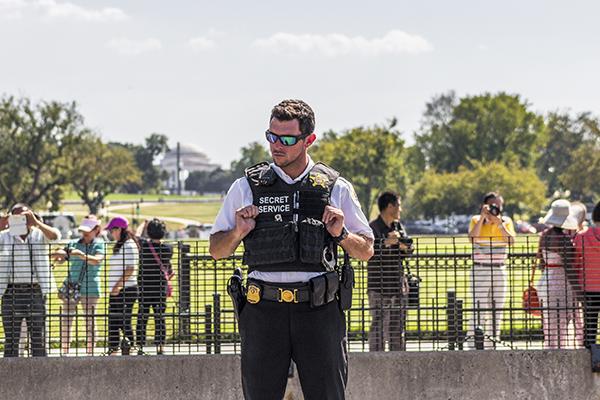The pope is coming, and GW students will be sure to know it.
In preparation for Pope Francis’ visit to D.C. this week, city officials are tightening security in anticipation of the hundreds of thousands of people expected to flock to the District as he visits the United States for the first time as pope.
The University announced that the Corcoran’s 17th Street building, GW’s closest building to the White House, will be closed Wednesday when the pope visits the president’s house, according to an Infomail message sent to students.
Officials said in the email they expect more pedestrian and vehicular traffic than usual. All other buildings will be open and students will have classes as usual during the pope’s five-day visit to the U.S., including his time in D.C. from Tuesday to Thursday, according to the email. The Vern Express and the University’s parking garages will also remain open.
The email also warned students not to let people into residence halls and advised them to lock the doors to their rooms and carry GWorlds with them.
“Restrooms in residential facilities are not public access areas,” according to the email.
During Pope Francis’ time in D.C., he will visit President Barack Obama at the White House, canonize a saint and address a joint session of Congress. He will also visit New York and Philadelphia on the trip.
University spokeswoman Maralee Csellar said GW is “working closely” with local and federal agencies as officials prepare for the pope’s visit.
She said the University cannot provide specific details of security actions because it could jeopardize the community’s safety.
“We do not discuss details of the University’s security operations,” Csellar said in an email. “Providing specific information and details is in itself a threat to the ongoing safety of our community.”
Pope Francis will address Congress on Thursday. Mayor Muriel Bowser invited the public to come out and watch the address, which will be broadcast on Jumbotrons on the National Mall, in a press conference two weeks ago.
James Murray, the special agent in charge of the Secret Service Washington Field Office, said at the press event that the pope’s visit was deemed a special national security event this May, the 50th time an event in the U.S. has been given that title. Other special national security events include Obama’s first State of the Union address in 2010 and certain Democratic and Republican national conventions.
He said in cases like these, the Secret Service plays a key role in developing and implementing the nation’s security plan, but the Federal Bureau of Investigation would take over investigating or responding to situations if there were a crisis.
A committee made up of 15 senior leaders from different federal agencies worked on the security plan, with 23 different subcommittees under those leaders, Murray said. He said the subcommittees included topics like air space security and crisis management.
“As a matter of course, the Secret Service carries out these responsibilities by forming strong partnerships with all participating law enforcement, public safety and military agencies,” Murray said.
While certain roads are being closed in the city, including a section of H Street between 15th and 17th streets in front of the White House, to accommodate for the pope’s travel, D.C. Department of Transportation Director Leif Dormsjo said at the same press conference that commuters should plan ahead and consider using public transportation.
“We are encouraging people to use transit,” Dormsjo said. “Plan ahead. The city is certainly open for business.”
Pennsylvania private security consultant Jack Dowling said college campuses in Philadelphia, such as the University of Pennsylvania, have cancelled classes to prepare for the pope’s visit. He said he is connected to the university through his profession, but that he is not in a contract with it currently.
Dowling said there could be other universities affected by the pope’s visit and that “all the security agencies are working closely with school officials to ensure proper coordination to ensure that the impact is at a minimum.”
Chris McGoey, a campus security consultant, said in an interview that campus police should be more involved in security planning efforts during major events in a city that could impact their campuses.
“Often times, campus security is a one-dimensional force, which only responds after a crime occurs,” McGoey said in a phone interview. “They are not proactive in preventing incidents from happening when they should be.”
Chase Smith contributed reporting.







